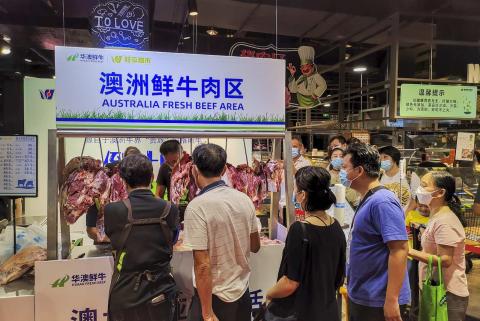The signing on 4 March of the Indonesia Australia–Comprehensive Economic Partnership Agreement (IA-CEPA) has been hailed as a major bilateral trade agreement and a diplomatic breakthrough given recent tensions between Canberra and Jakarta. However, now the negotiations are concluded, there may still be some challenging hurdles ahead to ensure the agreement’s ratification and entry into force.
While IA-CEPA has the standard entry into force provisions that require both sides to complete their respective necessary internal requirements, looming elections could prove troublesome. President Joko Widodo is facing a tough battle in Indonesia and given how turbulent the bilateral relationship has been in the past, and how Indonesian nationalist sentiment can be whipped up against Australia, Widodo’s support for IA-CEPA could be electorally toxic.
Indeed, from the opposing side, vice presidential candidate Sandiaga Uno has told Australian media that the agreement is unfair and that he would seek to amend requirements around beef quotas if elected.
With the Australian parliament only scheduled to sit for three more days before an expected May election here, there is little real likelihood that any serious consideration will be given in Canberra to the trade deal before the polls. Suggestions that Australia could ratify before the election are fanciful given the now well-established processes of the Joint Standing Committee on Treaties (JSCOT), a coalition initiative dating from 1996, and the need for the enactment of enabling legislation. In that regard, it is a firm rule of Australian treaty practice that treaties will not be ratified in the absence of such legislation. This practice is all the more important when Australia is on the brink of an election that may see a change of government.
Should a Shorten Labor government inherit the IA-CEPA and have responsibility for shepherding its entry into force via ratification, this is where the agreement could run into difficulty.
While negotiations over the trade deal were originally commenced under the Gillard Labor government, Coalition governments have had the principal carriage of finalising the agreement. A change of government in Canberra following the May election would therefore see a Shorten Labor government inherit the IA-CEPA and have responsibility for shepherding its entry into force via ratification. This is where the agreement could run into difficulty.
In recent years concerns have been raised about investor-state dispute settlement (ISDS) mechanisms in both plurilateral and bilateral trade agreements Australia has endorsed. Most prominently, Phillip Morris (Asia) was able to use ISDS provisions in a 1993 Hong Kong-Australia investment treaty to challenge Australia’s tobacco plain packaging laws. While Australia defeated that challenge in 2012, it came at a cost to the taxpayer of almost $39 million. Although Phillip Morris was ordered to pay these costs in 2017, nonetheless the fear of further expensive taxpayer-funded litigation has caused some to question the choice to include ISDS provisions in subsequent trade deals, including the renegotiated Comprehensive and Progressive Agreement for Trans-Pacific Partnership (TPP-11).
Most recently Labor called for, and was granted, the opportunity to review once again in JSCOT the 2018 Peru Australia Free Trade Agreement (PAFTA). While in November JSCOT endorsed Australian ratification of the PAFTA, Labor members continued to raise their concerns regarding the ISDS provisions and called for their removal.
There are also ISDS issues with the IA-CEPA, and Prime Minister Scott Morrison has claimed that Labor’s track record on this issue, including the PAFTA, could “risk” the future of the agreement. The agreement’s ISDS provisions allow Australian individuals and companies investing in Indonesia to directly challenge Indonesian laws that breach the IA-CEPA‘s investment obligations and cause loss or damage to the investment. Similar rights would exist for Indonesian individuals and companies investing in Australia.
Notably, the IA-CEPA excludes any action challenging laws “designed and implemented to protect or promote public health”, which is a deliberate attempt to bar any further challenges to Australia’s tobacco laws. If the complaint is by an Indonesian national, the dispute can be heard before an Indonesian court or tribunal with jurisdiction, or an international arbitral panel. The Australian government would be compelled to defend such a challenge, and as was seen in the Phillip Morris claim, this can be at considerable cost.
Given Labor’s National Platform and its commitment to seek to “remove” ISDS provisions from trade agreements, what options would a Shorten government have with respect to the IA-CEPA?
First, given the agreement has only just been signed, Labor could seek to renegotiate the ISDS provisions and excise them. This could only take place with Indonesia’s consent, which in turn could itself be dependent upon the outcome of the Indonesian presidential election.
Second, Labor could seek to leave the agreement intact but separately negotiate a side letter that would suspend the operation of the ISDS clauses. Such an approach has been adopted with the TPP-11, though side deals opting out of certain provisions between two parties in a plurilateral trade agreement may not be the best model for a bilateral trade deal.
Third, Labor could seek to renegotiate the whole trade deal. While not unheard of, such an approach would run the risk of significantly impacting the bilateral relationship, as would any suggestion that Labor would completely abandon IA-CEPA.
All of this indicates that Australia and Indonesia are facing some bilateral trade challenges in coming months, and the recently inked agreement cannot be considered a done deal until it has been ratified.

